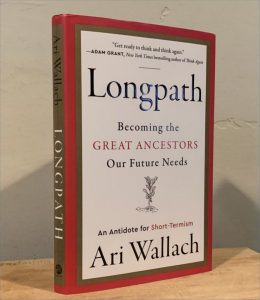This is a modest little book with great ambitions to change the way people think. And more power to it if it does. But for anyone who reads science fiction, for example, or is familiar with big issues and long-term thinking in the way writers like Carl Sagan and Neil deGrasse Tyson are, there isn’t much new here.
At the same time, this book does capture a central aspect of what science fiction, and its worldview, is all about. For people who think science fiction is about gimmicks and space battles, this book would be a corrective. No — it’s about this. Seeing the big picture. Taking the long-term view.
A proviso: The subject here seems to be adjacent to the topic of “long-termism”, popularized recently in a book (which came out the same day this one did) by William MacAskill, a topic which many commentators seem to regard as deeply sinister. But near as I can gather without having finished MacAskill’s book, Wallach’s book isn’t that. (Even though the secondary subtitle of Wallach’s book is “An Antidote for Short-Termism”.) Wallach does mention MacAskill briefly; MacAskill’s book doesn’t mention Wallach at all.
Wallach’s book, rather, might as well be in a narrative with another book I read recently, Justin Gregg’s If Nietzsche Were a Narwhal, reviewed here and here. That book warns that humans’ inability to anticipate future outcomes is itself an existential threat, when we fail to combat climate change, for example. The answer to that problem is the solution Wallach offers.
Wallach’s book is ambitious, pretentious at times, in offering itself as a book of wisdom to be passed down one generation to the next. There are blank, lined “journal” pages at the back for the reader to record their own thoughts. And patronizing at times, like a self-help book for people who cannot think ideas through for themselves. But there are some good points, ideas, and insights here, which I’ll summarize in bullets.
- The author is founder and executive director of Longpath, a site I have not examined closely.
- As a mundane opening example of the need for long-term thinking, the author describes how he got a notice from his daughter’s school about a late homework assignment, and how he tempered his immediate reactions of anger and insecurity to put things in context, in a Carl Sagan sort of way. We react short-term, and lose sight of the big picture.
- Considering the big pictures, author recalls the great transitions in history – the scientific revolution, the Enlightenment, and so on – as “Intertidals,” unstable areas of creativity and danger, from which not everyone will survive. And how we’re in such an Intertidal now.
- We need a new cultural narrative. What is the end goal? Where are we going? [[ My thoughts: what are the traditional religious answers to such questions? Fill up the world? Worship the creator? That’s it? ]] Author invites you to consider how many descendants you might have, and how your decisions now can affect all their lives. He acknowledges that this book is not for people who just want to live their lives, nor for those who see humanity “uploading” itself into a cloud. [[ Is this a swipe at MacAskill? ]]
- Author reviews why we have short-term thinking: that’s how our instincts evolved, i.e. they worked well for hundreds of thousands of years. Examples. But not now.
- To get our brains to think Longpath: 1) pay attention; 2) believe you can do better; 3) be proactive.
- The two pillars of Longpath: Transgenerational Empathy; and Futures Thinking and Telos.
- The ancient philosophers took a single human life span as their measure for being good. We need to think bigger than that.
- Author provides occasional “exercises” for the reader, as a self-help book would, e.g. ponder your own obituary, or eulogy. (p85)
- We tend to share an “official future,” that life will go on much as it has, but with more gadgets. We need to think more creatively. Imagine participatory futures; get off the hedonic treadmill, in which people always want more than they have.
- Realize the difference between some arbitrary goal, and the true goal. Good examples here, e.g. the difference between arbitrarily increasing the range of electric cars (a consumer goal), compared to the idea of creating 15-minute cities (where you don’t need to drive so far).
- Telos: what is the ultimate aim; to what end? The Second Coming? The Singularity? How about: a better us, a better species than we are now. Collective flourishing. [[ This dovetails with thinkers like Sam Harris and those before him, who imagine morality as the route to happiness and flourishing for the greatest number of people. ]]
- Author cites a device, a “trim tab,” invented by Buckminster Fuller, a small change that has a big effect, e.g. to turn big ships, and how to apply this idea in everyday life. Author’s personal example: smile and look people in the eye whenever possible.
- Morality is flexible. Example of the World War I Christmas truce. Find others, family, friends, colleagues, to extend this Longpath idea. Vision, conversation, facilitation, ways of being. Author cites Star Trek as a vision (and says “science fiction”). Know your audience; citizen engagement; free little libraries.
- In the Epilogue, author notes how, if our species does endure, we are in a very early stage of humanity’s history. (And thus things we can do now can have a long-lasting impact.)






